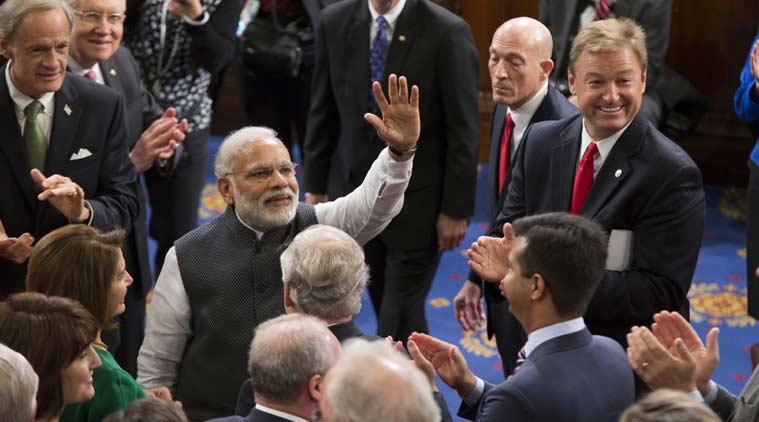Over the past few years, the world stage has seen India continually growing its sphere of Influence. Apart from the efforts of past Indian governments to aid this process, overseas persons of Indian origin and non-residential Indians have also played an instrumental role in shaping India’s position on the global arena as we see today. The most compelling evidence of this surge can be seen in the United States of America. Indian – Americans bearing the flag of friendship between two of the world’s largest democratic nations, have been working relentlessly to improve co-operation and interaction between two global giants.
What started as efforts by Indian-Americans to counter the influence of Pakistani political lobbies, Indian-Americans played a proactive role to counter anti –India political propaganda in recent years. Pakistani Lobby had been historically dominant due to close ties between US and Pakistan during the cold war, however the September 11 attacks in the United States, which saw around 3000 civilians losing their life to radical religious terrorism, brought a major shift in the US policy and its view of nations like Pakistan, which had been covertly supporting similar terror groups. Pakistan had to face the heat and rightly so as proved in 2011 when US special forces executed Osama Bin Laden the perpetrator of the heinous attacks.
The steady decline in Pakistan’s Internal political and security situation and also its patronage for several terrorist groups led to further aversion of US lawmakers toward Pakistan. However, at the same time India, a robust democracy, with its huge economic and strategic potential was successful in mobilizing more Indian-Americans in joining this resurgence which ultimately attracted more US lawmakers in the pro-India fold.
In a macro sense, this shift looks hugely influenced by changing geopolitical situations however microanalysis shows the indispensable role that Indian-American groups played to bring about this shift.
In the 1990’s when anti-India propaganda by Pakistan on Kashmir was at its peak in the United States, the Indo-American Kashmir Forum was formed by immigrant Kashmiri Pundits, which was also backed by some Congressmen in the United States, to gather support for the Kashmiri pundit community, and promote India’s stand on Kashmir. Indo-American Kashmir forum was successful in drawing attention of US lawmakers towards the exodus of more than 2, 50,000 of Kashmiri Pundits from the valley due to radical terrorist groups in the Indian State of Jammu and Kashmir. Led by Vinay Sazawal the Indo-American Kashmir forum, had also asked the state department of the Unites states to declare Pakistan a terror state.
Indian Americans, who were mostly apathetic to politics, had started taking interest in the Political discourse in the United States. Backed by their tremendous economic prosperity, Indian-Americans still remain one of the most well-off ethnic groups with respect to per-capita income in the United States.
During the Pokhran Nuclear tests, when India had defied international norms and conducted a nuclear test, Indian-Americans were fast to mobilize because of their higher strength and better economic conditions compared to their Pakistani counterparts.
What followed was setting up of powerful Indo-American groups for putting forward views of the sizable and affluent Indo-American population in the United States. Indian American Forum for Political Education is the oldest and largest political organization setup in the United States to empower Indians politically by raising their civic consciousness and increasing participation in community affairs and the mainstream political process. Indian American Forum for Political Education has since acted as a strong forum for Indo-American community.
Setting up of The U.S.-India Political Action Committee (USINPAC) was also a major boost to Indo-American community in the US, After the Congressional Caucus on India and Indian Americans was formed in 1994. In 2004, a bipartisan India Caucus was formed in the U.S. Senate which was headed by Hillary Clinton, Democratic senator of New York, and John Cornyn, Republican senator of Texas. This was the first time a Senate caucus was formed dedicated to a single country. The Caucus has not only been instrumental in countering anti-India propaganda by Pakistani and Chinese groups but have also played important role in pushing pro-India legislation through the Congress.
Influence of the Indo-American lobby has been continually growing since then, the passage of Indo-US civilian nuclear deal was another landmark success of the efforts of Indo-America lobby, with millions of affluent Indo-Americans rooting for the deal to be cleared. With Pakistan and China lobbying against this deal, Indian lobby taking the charge was successful in getting the landmark Nuclear deal signed between two nations. United States’ vehement efforts to designate terrorist Hafiz Saeed as a global terrorist despite opposition from China is a testament on how influential the India-American lobby has become.
Recent comments by Pentagon on India A-sat test also reiterate the growing impact of Indo-Americans on the political discourse in the USA. Pentagon, in a statement, has voiced its support for India’s anti-satellite ballistic missile test (A-SAT). Defending India for acquiring anti-satellite missile capabilities, Pentagon has in a statement before a state panel has said that India is concerned about the threats it faces in space.
The Indo-US trade has also seen a massive jump from a mere $5.6 billion in the 1990’s to a whopping $103 billion in 2015. With growing synergy, the United States has also dislodged the Russian Federation from being the largest defense partner of India. India also conducts the highest number of military exercises with the US and both nations have been exponentially growing their defense and economic cooperation.
The advent of Narendra Modi also energized the Indo-American community, which is evident from various political action communities which now exist in nearly every state in the United States. Direct interaction of Narendra Modi with Indian-Americans also played a huge role in mobilizing support for these groups. Sustained efforts by the Indo-American groups were successful in shifting the perspective of the erstwhile anti-India Congress to considering India a strong partner for global peace and prosperity.
